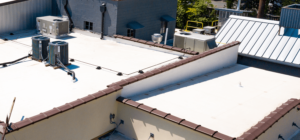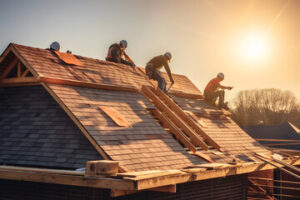Your roof is the first line of defense against the elements. Without regular maintenance, small problems like leaks and shingle damage can become major problems that require costly repairs.

A roof inspection helps nip these issues in the bud. These include identifying and repairing areas of energy loss, removing moss growth, and addressing blocked gutters. Contact Palm Coast Roofers for professional help.
The gutter system is one of the most important components of the roof. It protects the foundation of the house, prevents water damage, and helps control erosion. Regular inspections of the gutter system should be made to ensure they are functioning properly.
A thorough inspection should include checking the following:
Examine Debris: The inspector should check that there are no clogs in the gutters and downspouts by running a hose over the system. They should also examine the gutters for signs of rust, looseness, and separation. If necessary, the inspector should clean the gutters and downspouts using a ladder and a scoop. The gutters should be free of debris, such as leaves, twigs, and dirt that can cause blockages. A good quality gutter scoop makes this job much easier and safer.
Observe Water Flow: The inspector should inspect the downspouts to make sure they are working correctly and are directing water away from the house. If they are not, the gutters may need to be extended or redirected. The inspector should also look for any areas where the downspouts are leaking into the fascia board and recommend repair or replacement as needed.
Inspect Leaks: The inspector should look for any leaks around the gutter seams, joints, and end caps. If there are any cracks or gaps, the inspector should repair them with caulking or sealant. The inspector should also examine the flashing around vents, chimneys, skylights, and any other area where the gutter meets the structure of the home.
Pest Infestations: The stagnant water and moist, softened debris in clogged gutters often become attractive hangouts for pests. These pests can cause a variety of problems, including rodent infestations that lead to health and structural issues, as well as mold and mildew.
When the gutters are clogged, they can overflow and force water down onto the roof and into the walls of the house. This water can cause rot and leaks that will require expensive repairs. It can also create puddles that can seep into the basement and saturate the soil around the foundation, resulting in basement flooding. The extra moisture can also stain the side panels of the house. The best way to avoid these problems is to have the gutters cleaned regularly.
Trim the Trees
Trees are a beautiful part of any landscape, but they can also cause damage to your roof if left unattended. Many homeowners do not realize the potential risks of trees that overhang their home, but these branches can scrape against roofing materials during storms, damaging shingles and causing leaks. The best way to protect your roof is by regularly trimming the trees surrounding your house, but this is a job that is better left for professionals rather than homeowners who don’t have the proper tools and training.
A properly trimmed tree will allow the maximum amount of sunshine to reach your roof, which will help prevent moss growth and speed up the time it takes for your roof to dry after rainstorms. It will also reduce the risk of pests using trees to access your roof, and it can prevent moisture from building up underneath shingles or on the surface of your roof.
If you have any overhanging or obstructive tree limbs, it’s best to contact a professional, as this is a dangerous job that requires the use of a ladder and safety equipment. A skilled arborist can safely remove these limbs without harming the health of the tree or causing structural damage to your roof.
In addition to reducing the risk of damage, proper tree pruning will also increase your home’s curb appeal and add value to your property. By keeping the trees around your home well-trimmed, you will be able to enjoy the benefits of natural shade and windbreaks while maintaining the safety and integrity of your roof.
Aside from the potential for physical damage, overhanging tree branches can also make it difficult to clean your gutters. This can lead to clogged gutters and water running off your roof, which in turn can lead to ice dams that damage your roof over the winter. In addition, some branches can break off during a storm and fall onto your roof, which is why it is important to keep an eye on the growth of the trees near your home on a regular basis and trim them as needed.
Inspect the Flashing
The flashing is a key component of your roof and is the only barrier between the interior of your home and the elements. This is why it is important to inspect the flashing on your roof regularly. During your inspection, look for signs of cracking or warping of the metal flashing. Also, check that it is secure and not loose, as this can allow water to penetrate the roof. You should also check for gaps in the areas of the flashing where it meets other materials like shingles or skylights.
Flashing is typically made of rust-resistant aluminum or galvanized steel and is a series of thin strips of metal that run along the junctions of your roof and walls. Flashing is especially important at the joints where the roof meets a wall, a chimney or vent, and around skylights.
If you find that the flashing is damaged or has a leak, it will need to be replaced immediately. Leaking flashing can cause extensive damage to the roofing system and your home. You should be able to identify the source of the leak by looking for water stains directly below the area of the roof where the flashing is located, or you may see water stains in your ceilings or walls, depending on where the leak is coming from.
Leaking flashing is a common problem and can be caused by a variety of issues. Some common causes include improper installation, corrosion of the metal, and weather damage. Improper installation may occur when the flashing is not angled or sloped properly to ensure proper water flow and drainage. Additionally, corrosion of the flashing can be caused by corrosive chemicals from algae and other plant growth, which can degrade the sealant.
Another common cause of flashing leaks is when the flashing is not secured to the roof or the wall. This is usually due to the installer not using the right type of fastener or caulking. Flashing should be secured with caulk or roofing nails to keep it in place and prevent it from lifting or separating from the roof. The best way to prevent leaks in the flashing is to conduct regular inspections and make repairs as needed. By doing this, you can catch small problems before they turn into major repairs that could cost you thousands of dollars.
Inspect the Attic
An experienced Phoenix roofer doesn’t stop with the shingles; a thorough inspection includes the attic. Inspecting the attic provides valuable clues as to how well your roof was constructed. It’s essential that it be properly ventilated to prevent heat and moisture from damaging the rafters and sheathing. Poor construction, lack of ventilation, or both can lead to mold and rot – all serious roofing problems.
Insulation is vital to a healthy roof system, not only because it keeps living spaces comfortable, but also because it prevents energy loss and reduces the strain on your heating and cooling systems. An experienced roofer will look for signs of improper insulation, such as gaps or bald spots. Also, they’ll check the condition of the attic framing to ensure that it’s adequate for the weight and structure of the roof.
Inspecting the attic should always include looking for signs of pests, especially rodent droppings and chewed materials. Rodents and other pests can damage insulation and cause structural problems. They can also contribute to a clogged attic drain, which can cause ponding and other serious issues.
A good roofer will also examine the attic floor for water stains and mildew, which are indications of leaks. In addition, they’ll check the attic vents to make sure they’re intact and properly directing moisture and fumes to the outside. They’ll also inspect the valleys of your roof and the areas around skylights and chimneys.
The attic is a dangerous place for the uninitiated, so it’s best to have an experienced roofer conduct the inspection. However, if you must go into the attic yourself, be sure to wear a dust mask and exercise extreme caution. Also, be sure to clear any debris from the attic floor such as insulation, leaves, and twigs, which can retain water and promote mold growth. If you find any rotting or warping in the attic floor, it’s crucial that you call a roofer right away to address these issues. The longer they are left unchecked, the more severe the problem will be.

